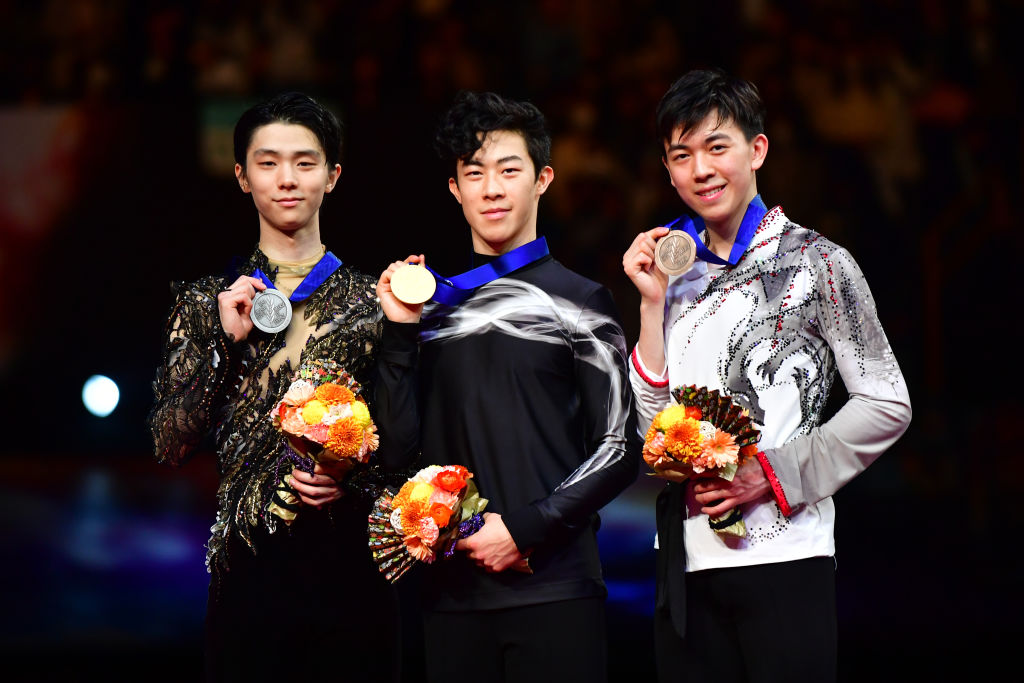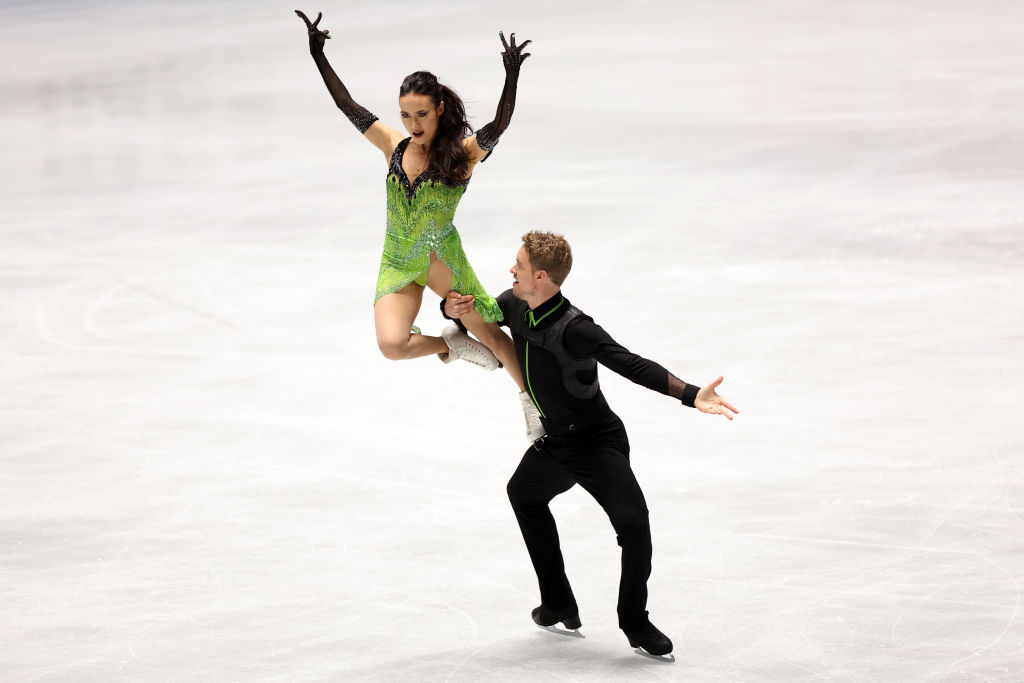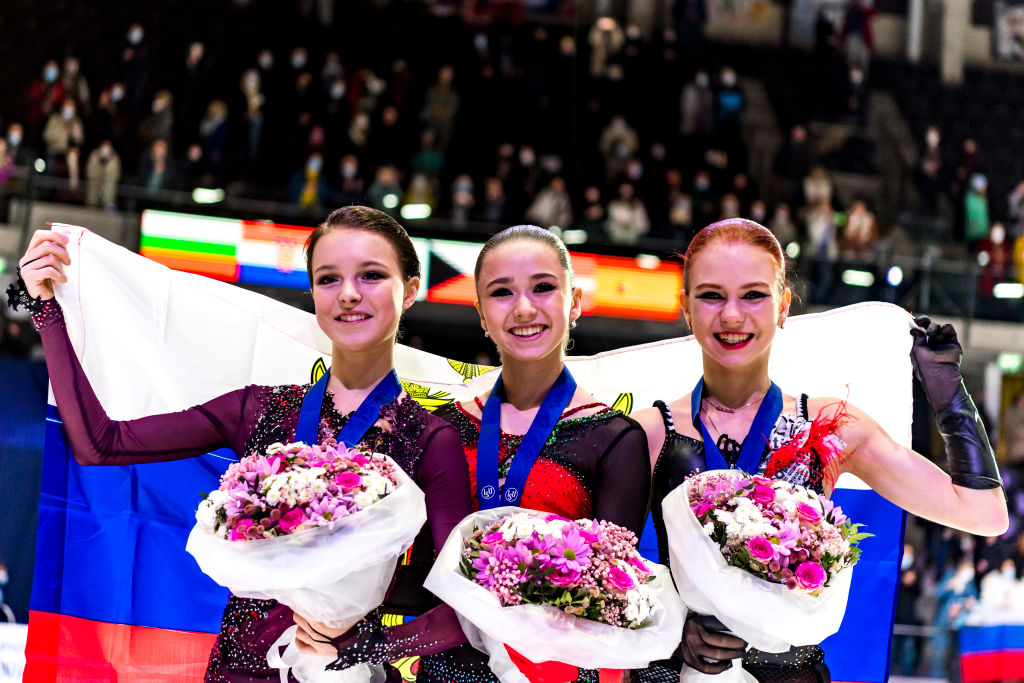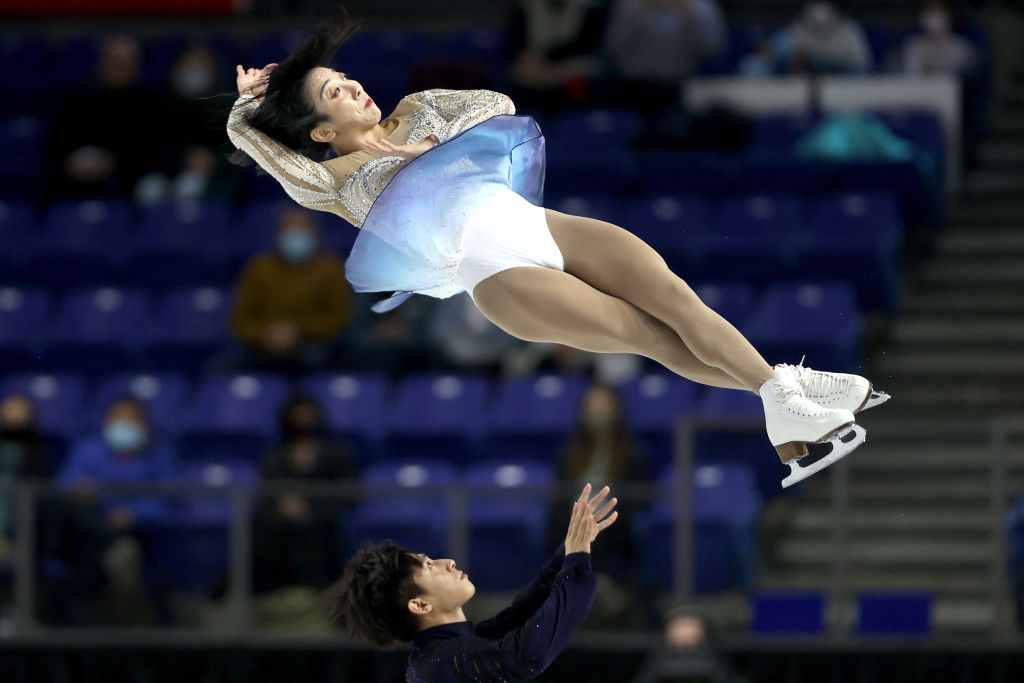If you’re a figure skating fan, the Olympics are the culmination of the sport’s constantly evolving skills, its drama and the inevitable tension and controversy over the judging. The 2022 Winter Olympic Games promises to deliver on all cylinders, from insane jumps to rivalries and training mates turned competitors.
The 11 figure skating events promise to raise the bar on what’s possible in the sport, but as with the entire Beijing Games, who ends up on the podium may have just as much to do with who is able to keep COVID-19 free as it does about staying on ¾ inch blades on a slippery ice surface.
Here’s your complete guide to each figure skating event in Beijing.
The team event: Feb. 4, 6 and 7
It all kicks off in Beijing on the morning of Feb. 4—which is Feb. 3 for East Coast viewers—with the first of three events in the team competition. Ten countries—Canada, China, the Czech Republic, Georgia, Germany, Italy, Japan, Russia (competing as Russian Olympic Committee), Ukraine and Team USA—have qualified to skate off for three medals. In the team event, each country’s coaches can create whatever mix of skaters they desire to compete in eight events—short and free programs for men’s, women’s, pairs and ice dance.
Read more: How to Tell the Difference Between the 6 Figure Skating Jumps You’ll See at the Olympics
The short program in each discipline serves as the qualifying event; skaters will be scored in the same way as in the individual events, but the leader will earn 10 points, the second-place finisher nine, and so on down the line. Only the five teams with the highest total points will compete in the final with free programs in each discipline. The team with the most points after the free programs will earn gold, the next highest score silver and the third-highest scoring team will take home bronze.
None of the 10 qualified countries is a slam dunk in all four events; the Russian team will likely score high in the women’s, pairs and dance competitions, while the U.S. will pile on points in the men’s and dance events, and Japan in the men’s and women’s disciplines. For the skaters, the team event is a good warm-up for the individual competition as it’s a chance to skate on Olympic ice and shake off any jitters.
When to watch:
Men’s figure skating: Feb. 8 and 10
The day after the team event, the men take the ice, on Feb. 8 in Beijing (Feb. 7 for viewers in the U.S.). All eyes will be on the renewed Olympic face-off between Japan’s Yuzuru Hanyu and Team USA’s Nathan Chen; Hanyu is the reigning Olympic champion and is armed with a jaw-dropping quadruple axel—technically not four rotations but 4.5 turns in the air—indisputably the most difficult jump in figure skating. Chen is looking for redemption after falling in the short program in Pyeongchang in 2018 and ending up in 17th place before rallying to skate the highest-scoring free program to end up in fifth. He says he’s approaching this Olympics with a different mindset, and ready to skate for his first Olympic medal.
Read more: 5 Things to Know About Figure Skating Champion Yuzuru Hanyu

But Hanyu and Chen aren’t the only competitors with a chance to collect hardware. Nipping at Hanyu’s heels are fellow Japanese skaters Shoma Uno and Yuma Kagiyama, though Hanyu has said the quad axel is his weapon to stand above the competition. Kagiyama, just 18 years old, earned silver at the 2021 world championships, behind Chen and ahead of Hanyu’s bronze and has said that skating is “indispensable in my life.”
Chen will also have a close rival in teammate Vincent Zhou, who is the only skater to break Chen’s winning streak since the 2018 Olympics by earning gold to Chen’s bronze at Skate America last fall. Russian contender Mikhail Kolyada won’t be competing in Beijing after testing positive for COVID-19 weeks before the Games.
When to watch:
Ice dance: Feb. 12 and 14
Following the men’s event, on Feb. 12, comes the rhythm dance portion of the ice dance competition. Each season, the International Skating Union assigns a dance theme for the rhythm dance, during which teams must execute skills specific to that genre of dance. This season, it’s street style, a broad category that incorporates everything from hip hop, krump, funk and popping to disco, swing and jazz. Teams are required to incorporate at least two different dance styles in their routine, and the more contemporary music has allowed them to interpret the rhythm dance in wide-ranging ways, with music that may be more familiar to the audience. Expect to see a nod to waacking and to hear everything from Tina Turner and the Commodores to Daft Punk.

After a day of rest, on Feb. 14 in Beijing the ice dance teams will compete in the free dance, where their personalities start to emerge. The top teams to watch are Gabriella Papadakis and Guillaume Cizeron from France, the reigning Olympic silver medalists, U.S. teams Madison Hubbell and Zachary Donohue and Madison Chock and Evan Bates, all of whom train together at the Ice Academy of Montreal. Russians Victoria Sinitsina and Nikita Katsalapov, who beat Papadakis and Cizeron at the European Championships in the 2019-20 season, are also strong contenders, along with Charlene Guignard and Marco Fabbri of Italy, who finished on the podium at this year’s European Championships and are trained by Olympic medalist Barbara Fusar-Poli and Roberto Pelizzola, and Piper Gilles and Paul Poirier of Canada, the bronze medalists from last year’s world championships.
With so many talented teams, reigning Olympic gold medalist Scott Moir predicts “it’s going to be a bloodbath to get on that podium. I can’t remember an ice dance Olympics where there are going to be so many good athletes going for so [few] medals,” he tells TIME. “It’s all going to play out in front of us, and those two days are going to be extremely dramatic. Buckle your seat belts, it’s going to be a wild ride.”
When to watch:
Read more: Everything to Know About the Beijing Olympics Opening Ceremony
Women’s figure skating: Feb. 15 and 17
The following day, on Feb. 15, it’s the women’s turn, and a highly anticipated potential sweep of the medals by the Russian squad—headlined by national and European champion Kamila Valieva, Anna Shcherbakova and Alexandra Trusova. Between the three of them, expect to see at least half a dozen or so quadruple jumps in their free programs—they’re illegal in the short program for women.

Trusova is the first female skater to land a quadruple Lutz, quadruple toe loop and quadruple flip in competition. Teammate Valieva, from Kazan, is just 15 years old and owns the highest recorded scores for both the women’s short program, free skate and total scores; she set the first at the 2022 European Championships and last two at Rostelecom Cup in 2021, and Shcherbakova has whipped off a quadruple flip and quadruple Lutz in competition. Beijing is likely to be a battle between these teammates, who all train together in Moscow with coach Eteri Tutzberidze, vying for the three medals in the women’s event.
When to watch:
Read more: Inside Tara Lipinski and Johnny Weir’s Rise From Olympic Figure Skaters to Beloved Commentators
Pairs figure skating: Feb. 18 and 19
Last but certainly not least is the pairs event, where powerhouse Russia will likely earn one if not two medals if they can hold off China. Anastasia Mishina and Aleksandr Galliamov, and country-mates Aleksandra Boikova and Dmitrii Kozlovskii of Russia are hoping to regain a pairs medal after Russia didn’t finish on the podium in 2018. They’ll face strong competition from reigning Olympic silver medalists Sui Wenjing and Han Cong from China, the hometown favorites, Wenjing and Cong are coached by Zhao Hongbo, a 2010 Olympic pairs champion. The pair set a high technical standard; their programs have included throw quadruple Salchow and quadruple twists—in both, Wenjing turns or twists in the air four times before landing after Cong throws her into the air—so watch for some crowd-pleasing feats of athleticism.

It’s also fun to watch pairs skaters return to Olympic ice with different partners. 2018 Canadian bronze medalist Eric Radford will compete with Vanessa James from France; the duo started skating together in 2021 after gliding around on the ice together and feeling an on-ice chemistry that convinced them to partner competitively. James received permission from the French federation to skate for Canada, but their decision has already generated controversy after they pulled out of Canadian nationals in January following the short program because they felt they weren’t prepared enough to continue competing since both skaters had just recovered from COVID-19 in December. Radford’s former Olympic partner, Meagan Duhamel, has also expressed disappointment on social media by Radford’s sudden decision to partner with James, saying she and Radford had planned on skating in shows.
From the U.S., Alexa Knierim will be back at the Olympics with a new partner, Brandon Frazier. Knierim was part of the U.S. team with husband Chris that earned bronze in the team event in Pyeongchang in 2018, and decided to continue skating with a new partner when Chris retired. The duo has only been training since spring of 2020, and Chris joined their coaching team that is led by world and national medalists Todd Sand and Jenni Meno. The pair was forced to withdraw from the U.S. national championships in January when Frazier tested positive for COVID-19, but was named to the Olympic team based on their performances this season. The pair is still learning to refine their collaboration, with Frazier getting tips from Chris on making their explosive twist element more consistent.
When to watch:
More Must-Reads from TIME
- Donald Trump Is TIME's 2024 Person of the Year
- Why We Chose Trump as Person of the Year
- Is Intermittent Fasting Good or Bad for You?
- The 100 Must-Read Books of 2024
- The 20 Best Christmas TV Episodes
- Column: If Optimism Feels Ridiculous Now, Try Hope
- The Future of Climate Action Is Trade Policy
- Merle Bombardieri Is Helping People Make the Baby Decision
Contact us at letters@time.com